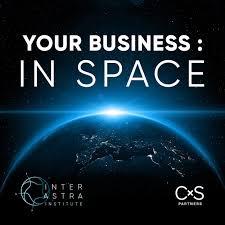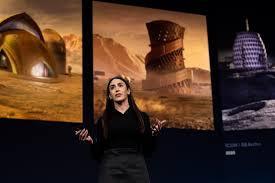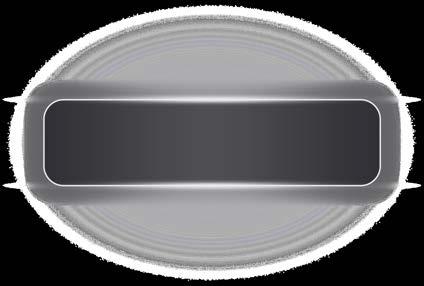

INTERSTELLAR
MAGAZINE

Che’ Bolden
Inter Astra Visionary
John Spencer Space Tourism Designer
Melodie Yashar, ICON’s
Space Architect
Eric Ingram, Newest Founder Scout Space, Inc.
Leading Magazine For Space Entreprenures
"THE EARTH AND THE UNIVERSE BEYOND BELONG TO ALL OF US.”

-Robin McDougal
INTERSTELLAR
Vol. 01
SPACE ENTREPRENURS
Resilience stands as a paramount trait for aspiring Space Entrepreneurs
COLUMBIA SPORTSWEAR RETAIL GIANT GOES TO SPACE
A smart partnership and smart materials make a great space exploration team
CHE' BOLDEN,
Building the global public square for the Business of Space Podcast.
VIRGINIA THE NEW SPACE HUB
A Growing hub for space and satellite companies
ERIC INGRAM
Eric Ingram, Founder, Chairman of the Board, and Chief Strategy Officer of Scout Space Inc.,Virginia Based Aerospace Leader
MELODIE YASHAR, VP OF BUILDING DESIGN & PERFORMANCE AT ICON
Space architect, technologist, & researcher

JONH SPENCER
A Growing hub for space and satellite companies Pg. 40 Pg.16 Pg. 29 Pg. 14 Pg. 10 Pg. 05 Pg. 31 Pg. 34
Space Tourism and Outer Space Architect

EDITOR'S NOTES
RobinMcDougal, Editor In ChiefWelcome to Interstellar Magazine, where we embark on a journey through the boundless expanse of the commercial space industry. Our mission is clear: to illuminate the rise of commercial space entrepreneurs and the transformative technologies they bring to the forefront, all while keeping our feet firmly grounded in the potential benefits for Earth and humanity (Space For Earth). In the pages of our magazine, you will discover the latest developments and trends shaping the ever-evolving landscape of the commercial space sector from remote sensing to cybersecurity, transportation to tourism, and beyond. According to Morgan Stanley, the commercial space economy is poised for unprecedented growth, with a predicted value of $1.7 trillion by 2040. At the forefront of this cosmic frontier are established titans and emerging trailblazers. Join us as we meet some of the fresh faces bringing a new perspective to the LEO to Lunar economy. We invite you to join us as we share entrepreneurs impacting the future of the commercial space economy designed for now and next!
Robin McDougal
“Space
for Earth has profound implications for humanity.”
-Robin McDougal
Interstellar Magazine is a carbon-neutral publication designed to be sustainable by reducing paper consumption, saving energy associated with magazine production, saving fuel needed for shipping, and pollution required to dispose of unused magazines.
RESILIENCE
Space Entrepreneurs
By Robin McDougalResiliencestandsasaparamounttraitforaspiringspaceentrepreneurs,poisedon thefrontierofinnovationandexploration.AsdefinedbytheNationalCenterfor BiotechnologyInformation,resilienceembodiestheabilitytoadaptpositivelyinthe faceofadversity.Thismultifacetedconcept,elucidatedbypsychologistslikeWerner andLuthar,underscoresitsrelevanceinthehigh-stakesrealmofspace entrepreneurship.
Inthecontextofspaceventures,resiliencemanifestsinseveralcriticaldimensions. Firstly,itencompassesthecapacitytonavigatethroughformidablechallenges inherentinspaceexploration,suchastechnicalsetbacks,financialconstraints,and regulatoryhurdles.Entrepreneursmustexhibitresiliencetopersistintheirendeavors despitetheseformidableobstacles,maintainingfocusontheirvisionforspace innovation.

Moreover,resilienceextendstotheabilitytosustaincompetenceunderstress,crucial inthedynamicanddemandingenvironmentofspaceentrepreneurship.Amidst uncertaintyandpressure,entrepreneursmustremainsteadfastintheirpursuitof excellence,demonstratingadaptabilityandfortitude.
Furthermore,resilienceentailstheresiliencetorecoverfromsetbacksandfailures, integraltotheiterativenatureofentrepreneurialendeavors.Inthefaceofsetbacksor failures,spaceentrepreneursmustdrawupontheirresiliencetobounceback,learn fromexperiences,andforgeaheadwithreneweddetermination.
Ultimately,resilienceservesasacornerstoneforsuccessinthespacesector,enabling entrepreneurstopersevere,innovate,andthriveamidstthechallengesand uncertaintiesinherentinthepursuitofspaceexplorationandcommercialization.By cultivatingresilience,aspiringspaceentrepreneurscanbetternavigatethe complexitiesofthispioneeringdomain,advancinghumanity'spresenceandpotential beyondEarth'sbounds.
“Leaders honor their core values, but they are flexible in how they execute them.”
OUR TEAM
Interstellar Magazine spotlights the current and new players in the commercial space industry and the next generation of space entrepreneurs taking their place in the growing commercial space exploration arena. Our contributors have their finger on the pulse of the trend known as the CisLunar Economy (economic activities between Low Earth Orbit and the Moon).

Sharon Reed
Space Business Editor
Sharon Reed is a writer and editor with a strong interest in space and technology. Currently, Sharon is the communications manager at the Fairfax County Economic Development Authority in Tysons, Virginia. She has a BA and MA from American University, School of International Service, Washington, D.C.
 McLee Kerolle
Space Law and Policy Editor
McLee Kerolle
Space Law and Policy Editor
A space law and policy analyst making the world a better place through space while working with the Space Court Foundation, Caribbean Space Society, Space Generation Advisory Council, and the Moon Village Association. Co-founder GSITA’s mission is to provide underrepresented communities access to workforce development in the space industry.

OUR TEAM
Interstellar Magazine spotlights the current and new players in the commercial space industry and the next generation of space entrepreneurs taking their place in the growing commercial space exploration arena. Our contributors have their finger on the pulse of the trend known as the CisLunar Economy (economic activities between Low Earth Orbit and the Moon).


Marketing and Media Editor
Founder of Suburban Entertainment Group, a Los Angeles-based film and television production company. A veteran of the entertainment industry for 20 plus years, Ms. Davis has produced: programming, music videos and national advertising campaigns, which include radio, print, and television commercials for Fortune 500 hundred companies.
LaTonya J. Pegues
Space Workforce Development Editor
AsCEOofBOAZEnterprises,LaTonya J.Peguesworkedintheaerospace andtelecommunicationsindustriesin avarietyofpositions;including satelliteandmissionsystems engineer,low-temperaturephysics researcher,andcommunications/PR expert.LaTonyaisCEOofBOAZ Enterprises,atraining,consulting,and communicationsfirm.
 Chimene Davis
Chimene Davis

BIOREGENERATIVE LIFE SUPPORT ENGINEER


Bio-regenerativelifesupportsystemsare artificial ecosystems designed to sustain humanlifeoverextendedperiodsoftime in space environments such as lunar or Martian bases. These systems are essentialforprovidingastronautswiththe necessary resources for survival, includingoxygen,water,andfood,while also managing waste and maintaining environmental conditions conducive to human health. Bio-regenerative life support systems represent a critical component of human space exploration, offeringthepotentialforautonomousand self-sustaining habitats beyond Earth's atmosphere.
ColumbiaSportswear CompanyPartnered withIntuitive MachinestoExplore theLunarSurface

“Creating and defining the lunar economy requires making the Moon available for everyone,” said Steve Altemus, president and CEO of Intuitive Machines.
Redefining LunarEconomy
Afusionofadvancedoutdoorgearwithspace explorationtechnology
By Robin McDougal“Inspired by the reflective technology used by NASA, our Omni-Heat Infinity technology has been tested in many challenging environments on Earth, but the Moon represents a first for us,” said Joe Boyle, Columbia brand president.
Columbia Sportswear Company (Nasdaq: COLM USD 77.15, February 7, 2024) is well known for providing active people with apparel, footwear, accessories, and equipment designed to feed their passion for outdoor exploration. With a history of innovation, Columbia Sportswear has entered a new era which keeps them focused on now and next. Now, they are hitchhiking a ride to the Moon. As of December 2021, Intuitive Machines’ was selected by NASA to build and launch their Nova-C lunar lander, However, they needed to solve the problem of the extreme temperatures found on the Lunar surface.


Intuitive Machines' researchers determined the gold metallic foil of Columbia’s Omni-Heat Infinity outerwear materials could provide insulation for their lunar lander against the extreme temperatures on the Moon. This first-of-its-kind collaboration demonstrates how a shared commitment to innovation, technology, and exploration brings humanity closer to lunar discovery.


COLUMBIA SPORTSWEAR, INTUITIVE MACHINES AND SARAFINA
NANCE TEAM UP TO SUPPORT WOMEN IN STEM FIELDS
Columbia,togetherwithIntuitiveMachinesandSarafinaNance,sharethecommon goalofsupportingmorewomenpursuingSTEMfields.Bycommitting$100,00 in scholarshipfunding,Columbiaintendstohelpwomenpursuingeducational opportunitiesinSTEMfieldsattaintheirgoals.
ColumbiaiscommittedtopushingoutdoorexplorationevenfurtherbytakingOmniHeat™Infinitytechnologytothemoonwhilefurtheringadvancementsforwomenin STEMandspaceexploration.Theprogramlaunchedinthefallof2023andsupports approximatelyadozenscholarshipsforundergraduateaswellasgraduatestudents atEmbry-Riddle. LearnMoreHere


Sarafina Nance
Astrophysicist, Analog Astronaut, Science Communicator, Author
Sarafinaisdedicatedtoincreasingscience literacyaroundtheworld.Shefellinlove withastrophysicsbecauseoftheperspective thatitoffershumankind.Sarafinainvitesus toconsiderjusthowsmallweare,andhow littleourday-to-daystrugglesmatterinthe contextoftheUniverse. Withher backgroundinsciencecommunicationand astrophysics,she'sabletodistillcomplex topicsintobite-size,accessibleinformation.
“My goal is to bring the cosmos to the world.”

SPACE SITUATIONAL AWARENESS ANALYST
ASpaceSituationalAwarenessAnalystis essentialformaintainingacomprehensive understandingofthespaceenvironment and ensuring the safe and effective operation of satellites, spacecraft, and otherspaceassets.Byprovidingaccurate andtimelyinformationonspaceobjects andpotentialhazards,theycontributeto the overall goal of preserving the integrity and accessibility of space for futuregenerations.
SpaceSituationalAwareness(SSA)isthe knowledge,characterization,andpractice of tracking space objects and their operationalenvironment. NASAExplains SpaceDebris



Building Systems to Unleash Innovation
CHE’ BOLDEN
 PRESIDENT & CEO
CHARLES BOLDEN GROUP
PRESIDENT & CEO
CHARLES BOLDEN GROUP

Creating

Access to The Business of Space
Meet Ché Bolden, a distinguished leader and visionary in the realms of military, policy, and technology. With 26 years of service in the Marine Corps, Ché has honed his expertise in political-military affairs, international relations, and critical infrastructure. As the former International Affairs Program Coordinator for the US Marine Corps, he spearheaded strategic initiatives and operational evaluations worldwide, ensuring global peace and security.
Ché is now the President and CEO of The Charles F. Bolden Group, an executive leadership firm established for the global advancement of science and security.
Che’ Bolden-Storyteller & Connector
As founder of the Inter Astra Institute, Che’ is spreading the message, “The business of space isn’t just about astronauts, scientists, and interstellar travel; it's about you, our children, and future generations. From advancements in daily technology to new job opportunities, space is part of everyday life. Listen to Che’ Podcast Series below.

VIRGINIA THE NEW SPACE HUB
By Sharon Reed
With its close proximity to the nation’s capital, the region is a hub for space and satellite companies
Like a gold rush for a piece of the rapidly growing and evolving space business, companies of all sizes and many segments of the industry are establishing or building their presence in Fairfax County and Northern Virginia.
With its close proximity to the nation’s capital, the region is a hub for space and satellite companies, from small start-ups to government contracting giants with space operations such as General Dynamics Mission Systems (Fairfax), Northrop Grumman (Falls Church area), Leidos (Reston) and Peraton (Herndon).

And while there are other space hubs nationwide, Fairfax County and Northern Virginia offer a unique combination of assets that make the region a magnet for companies of all sizes with space-related operations.
A recent arrival is Kent, Wash.based Blue Origin, the aerospace manufacturer and sub-orbital spaceflight services company founded by Jeff Bezos of Amazon fame. Slated to open in the first half of this year, according to the company website, Blue Origin’s Reston office will be the company’s newest engineering Center of Excellence. The focus of the center will be on space architecture, launch vehicle systems analysis, launch vehicle component design and validation, and safety and mission assurance.
Spire Global, which provides spacebased data, analytics, and space services and has offices in San Francisco, Boulder, Colo., Glasgow, Luxembourg, and Singapore, opened its new headquarters office in Tysons in October 2021 to accommodate the company’s growing team that provides support to its federal clients.
To find out why Northern Virginia is a growing space hub, the Fairfax County Economic Development Authority talked to five space and satellite company experts. Industry experts told us there are 10 reasons why the space industry has blasted off in Northern Virginia:
1. Location near the federal government With its location nearby to the nation’s capital, Fairfax County is nearby to NASA, the Department of Defense, the U.S. Space Force, and other agencies with space-related operations, including the National Geospatial-Intelligence Agency and the National Reconnaissance Office.
At McLean and Bedford, Mass.headquartered MITRE, proximity to the nation’s capital provides “access to our sponsors, the government agencies whose missions we support,” said Kerry Buckley, vice president, Air and Space Forces, MITRE.
MITRE’s space efforts span numerous federal agencies with space missions and authorities, including the Department of Defense, the Department of Commerce, and NASA.
“This is especially important as space missions across agencies evolve to address the growing space industry at the federal, commercial, and economic levels. We have entered a pivotal era that requires not only a whole-ofgovernment approach, but a whole-of-nation perspective as well,” Buckley added. “The Washington metropolitan area is a leader in innovation, drives policy, and boasts a wealth of academic resources – all essential factors for advancing and preserving the space domain.”
Northern Virginia offers a number of benefits to space companies from innovative startups to well-established large companies, Buckley said.
“Proximity to our legislative bodies and the federal agencies is essential for all space companies given the rapid growth and dynamic expansion of the industry.”
Whereas MITRE has had a long-time presence in Fairfax County since 1963, satellite telecommunications company SpaceLink, a subsidiary of Australiabased Electro Optic Systems, is a newcomer to the county, having opened its North American headquarters in March 2021 in Tysons.
Among the reasons for the decision to locate SpaceLink’s headquarters in Fairfax County was proximity to government agencies, said Dave Bettinger, SpaceLink’s founder and CEO. “A lot of the agencies that our relay system will serve are here, whether it’s NASA, or the intelligence agencies such as the National Reconnaissance Office, the National Geospatial-Intelligence Agency, and others,” Bettinger said.

Proximity to the federal government is also important because the space industry is very regulated, added Eric Ingram, CEO of SCOUT, a space tech startup he launched in Fairfax County in 2019 that is developing the next generation of space traffic management and autonomous proximity operations services, to make space a safer and more sustainable environment.
“At the minimum, you’ve usually got three different regulatory bodies that are involved in space licensing,” Ingram said. “So being able to interact and engage with government and those putting together regulations, those advising the regulations, is important.”
In our next issue, we will examine reason #2 Proximity to other companies.

AEROSPACE LAWYER



Space Lawyers play a crucial role in ensuring that space activities are conducted in accordance with legal frameworksthatpromotesafety,security, sustainability, and equitable access to outerspaceresources.Theynavigatethe intersection of law, policy, and technology to address the unique challenges and opportunities presented by the exploration and utilization of space.





Launch Here
SPACE ARCHITECT


Space Architecture isthetheoryand practice of designing and building inhabited environments in outer space. These environments include, but are not limited to: space vehicles, stations, habitats and lunar, planetary bases and infrastructures; and earth based control, experiment, launch, logistics, payload, simulation and test facilities. Earth analogs to space applications may include Antarctic, airborne, desert, high altitude, underground, undersea environments and closed ecological systems.SPACEARCHITECT.ORG


Interstellarisyourpremier magazinetailoredexclusivelyfor visionaryentrepreneursinthe aerospaceindustry.
Current, connected, and collaborative are the pillars of our digital magazine. Our mission is to connect you with potential investors, find top-tier workforce candidates, and spotlight lucrative contracts with NASA and emerging commercial space companies.






IN-SPACE MANUFACTURER



Space manufacturing refers to the process of fabricating, assembling, or integratingtangiblegoodsoutsideEarth's atmosphere, often utilizing the unique characteristicsofspacetoachievethis. This can involve transforming raw materials or recycled resources into components,products,orinfrastructure in space, either through human intervention or automated systems.The term"spacemanufacturing"encompasses various synonyms, including in-orbit manufacturing, off-Earth manufacturing, space-based manufacturing, orbital manufacturing,in-situmanufacturing,inspace fabrication, and in-space production.

Building Systems to Unleash Innovation

SCOUT SPACE, INC.,VIRGINIA BASED AEROSPACE LEADER
By Robin McDougalReston, Virginia-based Scout Space, Inc., is a pioneering in-space observation service provider specializing in space security and comprehensive Space Domain Awareness (SDA).
Scout recently unveiled its groundbreaking Owl product line, comprising advanced modular longrange SDA sensors designed to offer scalable solutions for a diverse range of operators. Leading the charge is Eric Ingram, Founder, Chairman of the Board, and Chief Strategy Officer of Scout Space Inc.
Eric's vision drives the company's mission to usher in a new era of space safety and transparency. Eric serves as a Board Member at the Space Frontier Foundation and as an Organizing Team Member & Ambassador for Mission: AstroAccess.
With a background as an Aerospace Engineer at the FAA's Office of Commercial Space Transportation and prior experience at Deep Space Industries, Eric brings invaluable expertise to Scout Space.

As someone with Freeman Sheldon syndrome,Eric is an advocate for making space flight accessible for everyone.
Render of Scout Space Owl on OTV Spacecraft
BLUE HAIR & SPACE BOUND
During the 2018-2019 federal government shutdown, Eric Ingram, a furloughed aerospace engineer at the FAA, laid the groundwork for Scout Space, driven by a vision for space safety and transparency.
Scout Space is dedicated to enhancing Space Domain Awareness through its innovative in-space products and services. Scout’s in-space products and services, first launched in 2021, allow spacecraft to see and understand things around them while on orbit.
. Backed by Techstars and notable venture capital, Scout Space was recognized as a 2020 MassChallenge Gold Winner, cementing its position as a trailblazer in the burgeoning space industry.
With a focus on responsible space utilization, Scout Space is poised to shape the future of space exploration and security.
On his free time, Eric proudly served as the President of the United States Wheelchair Rugby Association.

Eric is an active member of the adaptive sports community competing in the sport of wheelchair rugby for 15+ years. 30


We're going to be building on the Moon this decade -- and next will be Mars, says space architect Melodie Yashar.
MelodieYashar V.P.Architecture&BuildingPerformance
DeepSpaceHabitatArchitect
By Robin McDougalMelodie Yashar is a visionary space architect, technologist, and researcher dedicated to advancing the frontier of human habitation beyond Earth. Currently serving as the Vice President of Architecture & Building Performance at ICON, a pioneering construction technologies company, Melodie focuses on developing innovative construction methods to establish sustainable habitats on the Moon and, eventually, Mars.


At ICON, Melodie leads the architectural direction and performance evaluation of both terrestrial and off-world building systems. Collaborating closely with interdisciplinary teams, she drives the design and construction of resilient housing solutions on Earth while concurrently spearheading the development of cutting-edge construction technologies for extraterrestrial environments.
“I am passionate about being a collaborator, leader in design planetary geology, mechanical disciplines synthesizing with cutting edge technology.”
InadditiontoherroleatICON,Melodieisdeeplyinvolvedinacademia,teachingdesignstudiosattheArtCenter CollegeofDesign.HerextensivebackgroundincludesservingasaSeniorResearchAssociateatNASAAmes, whereshecontributedtohumansystemsintegrationresearch,andco-foundingSpaceExplorationArchitecture (SEArch+),anappliedresearchpracticespecializinginhuman-centereddesignsforspaceexploration.


Melodie's educational journey encompasses a Master ofArchitecturefromColumbiaUniversityandaMaster of Human-Computer Interaction with a focus on Robotics from Carnegie Mellon University. She possesses a fervent passion for exploring new materials and fabrication techniques, alongside a fascination with tiny robots. While she dreams of visiting the Moon in her lifetime, Melodie's ultimate aspiration is to contribute to the realization of sustainablehumansettlementsonMarsandbeyond.
What are you passionate about?
“Iampassionateaboutbeingacollaborator,leaderin designplanetarygeology,mechanicaldisciplines synthesizing withcuttingedgetechnology.”
How would you describe Space Architecture?
Melodie's educational journey encompasses a Master of Architecture from Columbia University andaMasterofHuman-ComputerInteractionwith a focus on Robotics from Carnegie Mellon University. She possesses a fervent passion for exploring new materials and fabrication techniques,alongsideafascinationwithtinyrobots. While she dreams of visiting the Moon in her lifetime, Melodie's ultimate aspiration is to contributetotherealizationofsustainablehuman settlementsonMarsandbeyond.
Image Credit: Stacie McChesney / TED
Designingfortheneedsofpeopleinouterspacewhile integratingthehumanfactor.Wethinkaboutthe materials,environmentalfactorsthatimpactthe structures,temperature,gravity,radiation.Wemaintain anemphasisinresearch.Wethinkabouthowdowe useindigenousmaterialsontheplanetMars”
What can a Young Emerging Professional learn from your journey?
Iwasalwaysinterestedinspace,butdidnotknowhow itwouldbeapartofmycareeruntiltherecentMars Projectcamealong.Persistandlearnwhatyoudonot know.
SPACE SUIT ENGINEER


SpaceSuitEngineersdesigntheoverallstructure ofthesuit,incorporatingfeatureslikelifesupport systems, communication devices, and mobility joints.Theyusecutting-edgetechnologiessuch as 3D modeling and simulation to optimize the designforfunctionalityandergonomics.
NASA: Advanced Space Suit Pressure Garment


TechnologyDevelopmentteamandinternslearn aboutworkrequiredtodesign,develop,andtest extra-vehicularactivity(EVA)pressuregarments forfuturespaceflightmissions.Theworkincludes testing of prototype hardware in the laboratory, Neutral Buoyancy Laboratory (NBL), and other venues to finalize design toward the flight configuration; performing test, analysis, inspections, and demonstrations to verify that designrequirementsarebeingmet.

Space Tourism Is Not Just A Leisure Activity



Space Tourism
By Chimene DavisSpace tourism represents the next frontier in human exploration, blending elements of aerospace, media, entertainment, and various other industries to offer unprecedented experiences beyond Earth's atmosphere. At the forefront of this endeavor is the Space Tourism Conference (STC), a convergence point for stakeholders ranging from aerospace giants to creative visionaries.
In a significant move towards expanding commercial space infrastructure, NASA has allocated substantial funding to three pioneering companies:
Blue Origin, Nanoracks LLC, and Northrop Grumman Systems Corporation. With a total investment of $415.6 million, these companies are tasked with designing and developing commercial space stations, marking a pivotal step towards a robust, American-led space economy in low-Earth orbit.
NASA's strategic vision extends beyond mere financial support; it aims to catalyze the emergence of a diverse ecosystem of space destinations.
Building the Space Tourism Economy
By fostering partnerships with private sector entities, NASA seeks to ensure a seamless transition from the International Space Station to innovative commercial platforms. These endeavors are poised to unlock a multitude of opportunities, from scientific research to leisure travel, while maintaining a continuous American presence in space.


The significance of these developments is underscored by NASA Administrator Bill Nelson, who emphasizes the agency's commitment to pioneering space commercialization. With private companies already facilitating transportation to low-Earth orbit, NASA's focus now shifts towards cultivating spaces where individuals can not only visit but also reside and conduct business.
In essence, space tourism is not just about leisurely voyages; it represents a paradigm shift in humanity's relationship with the cosmos. As we venture beyond Earth, we are not only exploring new frontiers but also laying the groundwork for a thriving space economy that holds promise for both scientific advancement and economic prosperity.
John Spencer Co-founder & ChairmanSpace
Tourism SocietyJohn Spencer and Co-founder Allison Dollar, Executive Producer CEO, ITV Alliance launched Space Tourism Society.
John Spencer is a trailblazing figure in the realm of outer space architecture, space tourism, and futuristic experience design. Since the late 1970s, he has been at the forefront of shaping the way we conceive of and inhabit space. His groundbreaking work includes interior design contributions to the International Space Station (ISS), for which he has received prestigious awards from NASA.
In 1982, John embarked on a visionary journey to pioneer the space tourism industry, drawing inspiration from the successful model of the cruise line industry. His visionary concept includes the design and development of an orbital super yacht named "Destiny," poised to offer unparalleled luxury and adventure beyond Earth's atmosphere.


Recognizing the growing interest and potential of space tourism, John co-founded the Space Tourism Society (STS) in 1996, laying the foundation for a community dedicated to exploring the possibilities of commercial space travel. He also played a pivotal role in establishing the Space Tourism Conference (STC), a platform that brings together key stakeholders from various industries to shape the future of space tourism.
John's creativity and innovation extend beyond Earth's orbit. As the co-founder and Chief Creative Officer of Mars World Enterprises, Inc., he has envisioned a groundbreaking $2 billion attraction and luxury resort called Mars World, set to captivate imaginations and redefine the concept of extraterrestrial hospitality.
Among his many visionary projects, John's crowning achievement is the creation of Destiny, the world's first orbital superyacht. With its lavish amenities and breathtaking vistas of space, Destiny promises to offer an unparalleled off-world experience, marking a new frontier in luxury travel.
John Spencer's pioneering spirit and relentless pursuit of innovation have positioned him as a driving force in the development and promotion of the Space Experience Economy (SEE). Through his visionary leadership, he continues to inspire generations to dream boldly and explore the possibilities of a future among the stars.


SPACE LAW THE LAW OF OUTER SPACE
A Space Lawyer, also known as an aerospace lawyer or space law attorney, specializes in the legal aspects of activities and operations related to space exploration, utilization, and commercialization. Their role is pivotal in navigating the complex and rapidly evolving field of space law, which encompasses a wide range of legal issues pertaining to outer space.
At its core, space law governs the conduct of both state and non-state actors in outer space and regulates various aspects such as satellite communications, space debris management, space exploration, space tourism, commercial space activities, and even potential issues such as space mining and colonization.
Space Lawyers primarily deal with:
International Space Law which includes treaties, agreements, and conventions established by international organizations such as the United Nations (UN) to regulate the activities of countries in space. Key treaties include the Outer Space Treaty, the Rescue Agreement, the Liability Convention, and the Registration Convention.
National Space Laws: Space Lawyers advise governments and space agencies on the development and implementation of national laws and regulations governing space activities within their jurisdictions. These laws cover issues like licensing and permitting for launching satellites, space tourism regulations, and liability for damages caused by space objects.
Commercial Space Activities: With the increasing involvement of private companies in space exploration and utilization, Space Lawyers assist in drafting contracts, negotiating agreements, and resolving disputes related to commercial space ventures. This includes contracts for satellite launches, space tourism operations, space mining, and satellite communications.
Intellectual Property Rights Space Lawyers deal with intellectual property issues arising from inventions, discoveries, and innovations made in space. They help companies and individuals protect their patents, trademarks, and copyrights related to space technologies and applications.
Environmental Protection and Space Debris
Mitigation: Space Lawyers contribute to the development of regulations aimed at preserving the space environment and minimizing the risks of collisions with space debris.

Space Communication Corner

COMMUNICATION
MAKING SPACE TO BE A BETTER COMMUNICATOR
By LaTonya J. PeguesHave you ever had a time where you enjoyed your work environment and the project you were working on? And at some point, someone on the team became a challenge to work with and their personality brought a different atmosphere to the job that was not positive? Has anyone ever told you that you should consider working on your non-technical skills? And based on your interaction with your co-workers, have you been told there are areas that you can work on to be a better team player, and do your part to make the work environment a more desirable place?
Even if you are new to the workplace or new to interacting in person with others, there are a variety of ways to learn to work well with others as a team. There is a certain joy that can be experienced when going to work and feeling like you can do your best work in an environment that is welcoming and where you can enjoy the journey as you work on and complete your assignments.
Knowing how to work well together, is almost as important as creating, planning, and completing a mission or a project.
f you can use ideas on how to improve your communication and team building skills,
Here are 6 Ways to make the space to become a better communicator and a better team member at work:
Make Eye Contact and Say, “Hello”
When you see someone walking down the hallway, even if you don't know them, share a smile, say, “hello,” make eye contact.
.
Noticing someone and acknowledging them is a polite thing to do, and it's a great way to meet people. Have you ever seen the SAME person in the hallway several times in one day? It would seem especially awkward if you haven’t acknowledged that person after several sightings. Even if you are shy, this is a good skill to have. You might end up working on a project with the people you said, “hello” to in the hallway. It could be a good thing that you said. “hello” because you would have already developed a rapport with them.
Double Check Your Work
When writing an e-mail check your work for errors and missing words. Sometimes when we write an email, text, or handwritten note in a hurry we have missed a word or a phrase.

COMMUNICATION
MAKING SPACE TO BE A BETTER COMMUNICATOR
We may have written a sentence in a way that makes absolutely no sense. And let’s not forget how auto correct can change our words without our permission! It is a good idea to double check your correspondence before pushing the “send” button.
Use Spell Check
With spell check enabled on most software, it can be surprising to discover how many emails, text messages and documents have spelling errors.When we are being paid to do a job and to provide services and products for clients and customers, it is a better idea to use spell check every time. There is a professional standard to uphold, and multiple spelling errors are a reflection on you and the quality of work you produce.
Give People Complements
A great way to make people feel like they are part of a team is by noticing when someone has done something noteworthy and letting him or her know. A compliment can go a long way. Saying something nice about a person’s workrelated idea or contribution does not mean that there is no room for growth or room for additional ideas that can be provided that still can be built upon.
Complementing and saying nice things about someone professionally can also spark creativity and it helps people feel like they are a part of a team, and not just holding a spot.
Give People Credit For their Ideas
How have you ever experienced someone else taking credit for your idea? Was it an idea that was publicized and people outside of your department heard about it? How did that make you feel? Probably not so great. Having experienced not getting your credit, when you have an opportunity to give somebody else credit for their work, will you?
A Safe Space For Complaints to be Heard
A better team environment includes one where people feel like they won't be attacked, retaliated against, or felt left out of future communications because they had a grievance.
Create the type of atmosphere if a coworker has a complaint, suggestion, or has a situation that needs to be addressed, that person will feel comfortable making the complaint and have the belief that their issue will be addressed.
If you have ideas or headings you would like to add to this list, send me a direct message on social media and Stay tuned for more more tips!

Collective Intelligence
Shared intelligence solving complex problems.

Cislunar Ready
By Chimene DavisCislunar space, the region between Earth and the moon, holds immense potential for sustainable human presence beyond our planet. Similar to how the interstate highway system fueled economic growth in the U.S., developing infrastructure in cislunar space can open up new avenues for economic expansion. Purdue University's Cislunar Initiative aims to lead this endeavor by providing essential building blocks for infrastructure, harnessing space resources, shaping space policy, and offering educational opportunities. By focusing on cislunar space, we pave the way for a vibrant and sustainable lunar space economy, laying the groundwork for humanity's continued exploration and utilization of space resources.
The emerging new space economy is increasingly inclusive, offering opportunities for a wide range of individuals and industries to participate and benefit. Morgan Stanley's Space Team forecasts a significant growth trajectory, estimating the global space industry to potentially reach over $1 trillion by 2040, up from around $350 billion presently. This growth encompasses diverse sectors such as inclusive spacesuit design for women, space manufacturing, mining, transportation, space debris mitigation, and Low Earth Orbiting communication satellites. As the space industry expands, it creates a plethora of opportunities for entrepreneurs, innovators, investors, and workers across various fields, democratizing access and participation in this dynamic and lucrative sector.
INTERSTELLAR MAGAZINE

